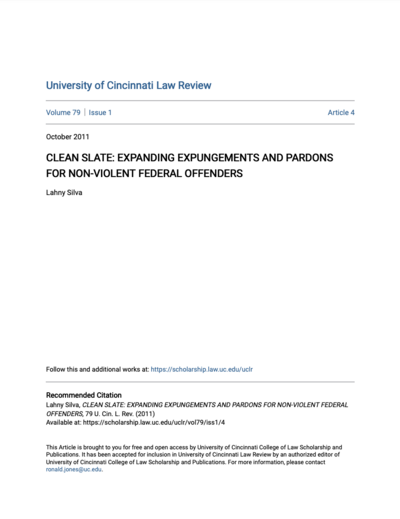Clean Slate: Expanding Expungements and Pardons for Non-Violent Federal Offenders
Journal Article
Clean Slate
Topics:
Collateral Consequences
Criminal and Juvenile Records
Records Clearance, Expungement, and Sealing
Reentry population:
Adults
Date:
Source:
University of Cincinnati Law Review
Clean Slate: Expanding Expungements and Pardons for Non-Violent Federal Offenders
This Article, from the University of Cincinnati Law Review, argues that individuals who have served their sentences and abided by the law for some period afterward should be given the opportunity to rid their slates of their criminal histories. Such expungement of criminal convictions for individuals who demonstrate that they will abide by the law are likely to reduce the costs of the criminal justice system and improve the lives of ex-offenders.
- First, this Article examines post-conviction penalties and contemporary recidivism trends.
- Second, this Article investigates the law governing federal pardons and judicial expungements, finding that the doctrines and their applications lack consistency, making it difficult for non-violent offenders to re-enter mainstream society.
This Article argues that simply eliminating post-conviction disabilities would be extremely complex and perhaps not practically or politically feasible. Moreover, the two existing federal post-conviction remedies—pardons and judicial expungements—are not designed to, and cannot as a practical matter, provide systematic relief from post-conviction disabilities.
Using state post-conviction mechanisms as examples, this Article argues that congressionally sanctioned expungements are an attractive alternative to relieve non-violent offenders of the effects of post-conviction disabilities.
The author proposes that the United States Sentencing Commission (U.S.S.C.) create a Second Chance Advisory Group to determine how best to ameliorate the collateral consequences of federal convictions. With a Second Chance Advisory group, the U.S.S.C. could be used as a vehicle for researching and recommending legislative policy initiatives that will effectively slash incarceration, recidivism, and opportunity costs.




